Artist 'reclaims' brown cotton named after racial slur
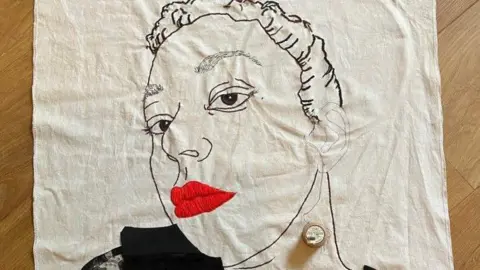 Janina Rosina
Janina RosinaWhile sorting through her late mother's belongings, Janina Bacchetta had a shock when she discovered an old reel of brown cotton thread, the colour of which had been named after a racial slur.
She was immediately triggered back to an early memory of experiencing racism - one that she did not understand at the time.
The textile artist, from Gloucestershire, also known as Rosina Nina, has since set her mind on renaming and "reframing" the thread in a project called The Power of Words.
With each reel she will quilt portrait pieces, as well as collect any other thread that may still exist, in an attempt to "recall the product".
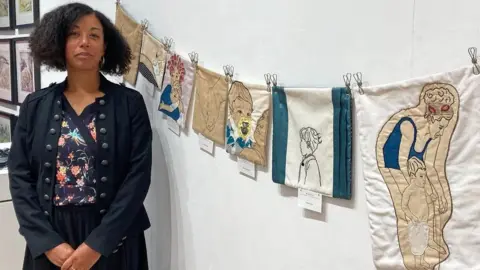 Janina Rosina
Janina RosinaThe brown cotton threads were produced by John Dewhurst and Sons from the 1820s until the company renamed them in the 1970s.
"I couldn't believe that was the name that someone had decided to call this beautiful brown thread. I was shocked and horrified," Ms Bacchetta said.
"These old things felt like they were from a lost era, a time gone by - turbulent times.
"I’d realised that myself, my sister and brother, we were all born in this turbulent time in Britain in the 1970s and 80s."
Ms Bachetta said she had grown up in a "culturally mixed" family, adopted by Italian parents with a West Indian sister and a half Pakistani brother.
"We all experienced forms of racism, but since opening that box of items I've wanted to find out more.
"I wanted to find out even more about black British culture and to find common voices and experiences highlighting discrimination."
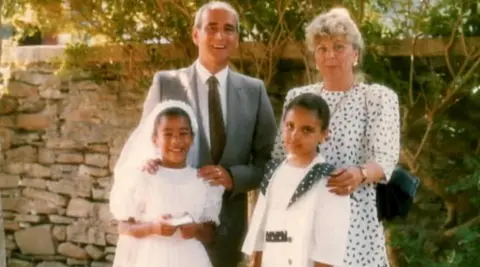 Janina Rosina
Janina RosinaShe continued: "But I also want to celebrate people."
The artist said the portraits would be given a name that related to how the subject's loved ones and friends saw them, to "reclaim the negative narrative".
"The thread in the portrait will become just a small part of the story," she said.
"These objects need to exist and be a reminder of our joint histories, but shown in a different light."
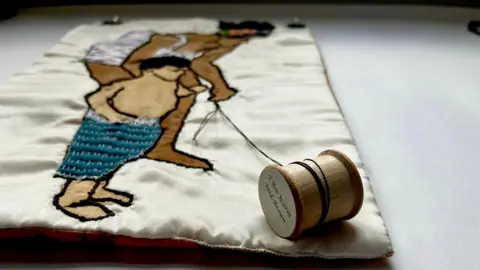 Janina Rosina
Janina RosinaMs Bachetta has already started making a portrait of herself using the thread and has made another miniature one of her and her son on coffee-stained silk.
She changed the name of the thread used in the miniature piece to read, "I am a warm mid-brown".
Portraits of two people from Bristol are in the process of being made using the thread but Ms Bacchetta said she aimed to make more.
"The threads are hard to find, they're also really expensive but, every time I do find one, that's an opportunity to meet someone new and create a portrait," she said.
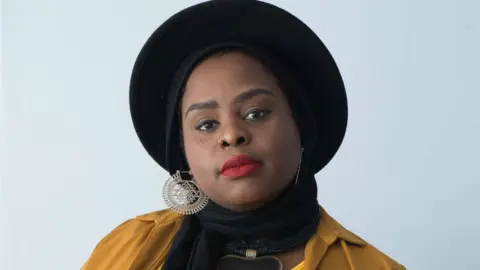 Muneera Pilgrim
Muneera PilgrimBristol poet and writer Muneera Pilgrim has been chosen for one of the portraits.
She said Ms Bacchetta was "brave" to share her personal journey through her art.
"Something can retrigger you, but how do you revisit it in a way that empowers and dignifies," she said.
"Racism and some of these oppressions are so subtle.
"Its history is embedded into the fabric of England, and to attempt to go back and undo and analyse that, I think that's really brave."
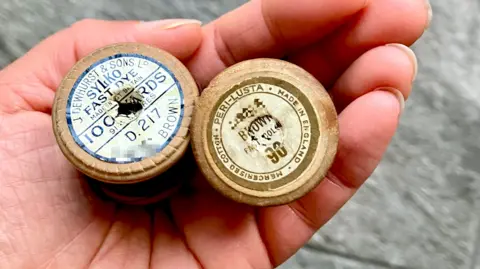 Janina Rosina
Janina RosinaMs Pilgrim continued: "It's important we go into our countries' stories and recontextualise them, we can't change what has happened, but what we can do is tell our narratives within that space and reframe it."
She said people's stories could be "complicated to tell".
"I'm interested in how she is going to use a different modality to challenge society.
"I'm really excited to see the portrait when it's done, I think it's going to impact me more than I know," she added.
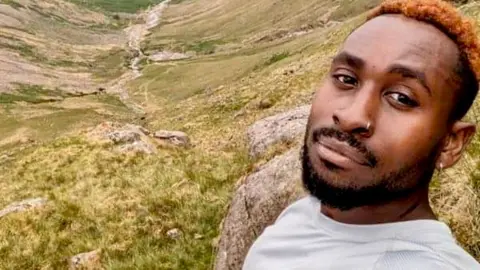 Cory Stewart
Cory StewartBristol therapist Cory Stewart said there was a part of himself that needed "to be part of this project".
"I want people to just see a human being, a well-rounded human being that does normal things, when they see my portrait," he said.
"I don't want it to be all about, 'here's my response to racism'.
"But we also can't shy away from history."
'I didn't fit in'
Ms Bacchetta asked Mr Stewart if he wanted to share an item to be sewn into his portrait.
He gave her his school tie to represent his "fractured relationship" with his identity when he was younger.
"I went to a secondary school in south-east London and then moved on to a grammar school in Kent.
"There was a lack of reference points for me and my identity in Kent. I felt a level of shame over the parts of my background that didn't fit in there."
He added: "Since then I've had to relearn and rebuild my sense of who I am and what it means to be a black Caribbean of African descent."
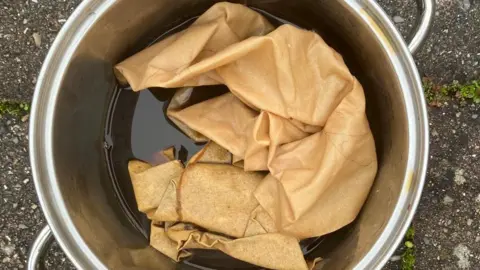 Janina Rosina
Janina RosinaMs Bacchetta plans to show the completed portraits at Llantarnam Grange in Cwmbran next year.
"I'd also like to bring them to London and Bristol's Arnolfini," said.
"With the falling of the Colston statue it seems like a really good place to revisit the conversation on what do we do with historical objects that are racist."
Follow BBC Bristol on Facebook, X and Instagram. Send your story ideas to us on email or via WhatsApp on 0800 313 4630.
